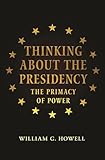Thinking about the presidency : the primacy of power / William G. Howell with David Milton Brent.
Material type: TextLanguage: English Publisher: Princeton : Princeton University Press, [2013]Description: xiii, 185 pages ; 25 cmContent type:
TextLanguage: English Publisher: Princeton : Princeton University Press, [2013]Description: xiii, 185 pages ; 25 cmContent type: - text
- unmediated
- volume
- 9780691155340
- 352.230973 23
- JK516 .H675 2013
| Item type | Current library | Home library | Collection | Shelving location | Call number | Copy number | Status | Barcode | |
|---|---|---|---|---|---|---|---|---|---|
 Libro
Libro
|
Biblioteca Juan Bosch | Biblioteca Juan Bosch | Automatización y Procesos Técnicos | Automatización y Procesos Técnicos (1er. Piso) | JK516 .H675 2013 (Browse shelf(Opens below)) | 1 | Available | 00000195002 |
Includes bibliographical references (pages 149-172) and index.
On being president -- Bearing witness -- Constitutional foundations -- Contrasting conceptions of executive leadership -- Misguided entreaties -- What failure looks like -- Limits.
All American presidents, past and present, have cared deeply about power--acquiring, protecting, and expanding it. While individual presidents obviously have other concerns, such as shaping policy or building a legacy, the primacy of power considerations--exacerbated by expectations of the presidency and the inadequacy of explicit powers in the Constitution--sets presidents apart from other political actors. Thinking about the Presidency explores presidents' preoccupation with power. Distinguished presidential scholar William Howell looks at the key aspects of executive power--political and constitutional origins, philosophical underpinnings, manifestations in contemporary political life, implications for political reform, and looming influences over the standards to which we hold those individuals elected to America's highest office. Howell shows that an appetite for power may not inform the original motivations of those who seek to become president. Rather, this need is built into the office of the presidency itself--and quickly takes hold of whomever bears the title of Chief Executive. In order to understand the modern presidency, and the degrees to which a president succeeds or fails, the acquisition, protection, and expansion of power in a president's political life must be recognized--in policy tools and legislative strategies, the posture taken before the American public, and the disregard shown to those who would counsel modesty and deference within the White House. Thinking about the Presidency assesses how the search for and defense of presidential powers informs nearly every decision made by the leader of the nation.
There are no comments on this title.

